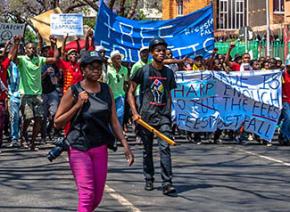Why the fees must fall
Students at universities across South Africa reacted to the government's plan for a sharp increase in tuition fees with the biggest wave of student struggle since the fall of apartheid. After just over the week, the government caved and promised that plans for the hikes would be shelved. , a South African socialist and member of Keep Left, reports on the victory for students--and the struggles still to come, in an article previously published by the Australian newspaper Red Flag.
AFTER 10 days of unprecedented protests, students in South Africa have won a demand that there be no increases in university fees next year.
On October 14, students at Wits University in Johannesburg boycotted classes, shut down the campus and occupied the administration building. Beginning the following Monday, students at 20 of the 23 universities across the country embarked on similar actions. On the day that the president, Jacob Zuma, announced that fee increases were being scrapped, eyewitnesses report that between 30,000 and 50,000 students besieged government offices in the capital of Pretoria during a mass protest.
Many students who enter South African universities are underprepared by poor schools in working-class townships and rural areas. They struggle to deal with the coursework and have to work part time to make ends meet. Having to deal with demanding study between shifts reduces focus and results in frustration, stress and at times academic failure.
There is financial aid available. But bursaries only go to people whose families have low incomes. Many students face difficulties. It is only the children of the 1 Percent who have no worries.

The cancellation of the fee increase is a victory. It is a win against the hated policies of neoliberalism. It is a win against the arrogance of the African National Congress government. It is a win against the police, who brutalized protesters.
However, it is not the end. The goal of a university degree is out of reach for thousands of students. As a teacher in Bishop Lavis, a working-class area in Cape Town, put it:
I was having a discussion with my students last week when the Wits students began protesting. They argued that even if they pass matric, they can't afford the costs associated with university or tertiary education. They argued that they were only being educated to work as till operators in supermarkets or to join the criminal gangs. They questioned as to why they should therefore bother with writing final high school exams.
They are right. The win does not address the issue of student debt. Those who are fortunate enough to get loans still have to pay them off.
MANY STUDENTS argue that the demand that "fees must fall" means not only that there must be no fee increases, but that there must be no fees at all.
One of the other demands is that universities end outsourcing. At two universities, this campaign has been heating up and has been given added profile by the protests over fees. Workers from these two campuses have met to plan wildcat strikes to demand that they be employed by the universities.
Workers are also demanding decent working conditions. They are victimized and prevented from joining trade unions.
The University of Cape Town Left Students Forum said in a statement: "Let's get rid of outsourcing. We cannot continue to tolerate the exploitation, victimization and intimidation of outsourced workers. We cannot continue to not take responsibility when we are responsible. Forward to a living wage! The companies must go! The workers must stay!"
They are absolutely right to argue this. The vicious policies of capitalism cause misery for both workers and working class students. The rich must be taxed. Education must be free. Workers must be paid a living wage.
Until this happens, South Africa will continue to experience the protests that we are seeing now.
First published at Red Flag.


